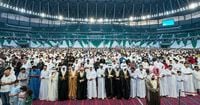Every year, the determination of the first day of Eid al-Fitr varies among Arab and Islamic nations, with discrepancies often arising even within a single country. This year, the announcements regarding the start of Eid have highlighted these differences more than ever. On Sunday, March 30, 2025, countries including Saudi Arabia, Qatar, the United Arab Emirates, Kuwait, Bahrain, Yemen, Palestine, Sudan, Somalia, Lebanon, and Mauritania declared it the first day of Eid al-Fitr. In contrast, Egypt, Syria, Jordan, Iraq, the Sultanate of Oman, Tunisia, Libya, and Algeria announced that Monday, March 31, 2025, would mark the holiday.
The Egyptian President, Abdel Fattah El-Sisi, took to social media to extend his warm wishes to the Egyptian people and the broader Arab and Islamic communities. On March 30, he posted on his official Facebook account, "I extend my sincerest congratulations and best wishes to the great Egyptian people, and to the Arab and Islamic nations, on the occasion of Eid al-Fitr, praying to Allah to bring it back with goodness, Yemen and blessings, and to protect our dear Egypt, making it forever advanced, prosperous, secure and stable." He concluded his message with, "Every year and you are well, and happy Eid to all."
The varying dates for Eid al-Fitr stem from the traditional practice of sighting the crescent moon, which marks the end of Ramadan and the beginning of Shawwal, the month that follows. According to the Egyptian Mufti, Nazih Iyad, the differences in moon sighting among countries are normal due to varying conditions for visibility. He emphasized that each country is entitled to follow its own sighting according to what its scholars determine based on legitimate astronomical criteria.
In light of this year's announcements, the International Astronomy Center clarified that the responsibility for declaring the beginning of lunar months lies with official authorities rather than astronomers. Their role is to provide scientific information regarding the visibility of the moon and whether it can be seen from specific locations.
As Eid al-Fitr approaches, the mood among the peoples of Arab countries is mixed, with celebrations taking place against a backdrop of ongoing economic and political crises. In the Gaza Strip, for example, despite the devastation and the sounds of Israeli airstrikes, residents have stepped out to celebrate Eid, seeking a glimmer of joy amidst hardship. In Syria, displaced families are welcoming Eid while reflecting on the toll of the ongoing conflict, marking the first holiday since the fall of Bashar al-Assad's regime.
The divisions among Arab nations regarding Eid's start date have sparked discussions about the reliance on moon sighting. Some neighboring countries have made conflicting announcements, with some declaring the sighting of the crescent while others reported challenges in visibility. For instance, while Saudi Arabia and its neighbors confirmed Sunday as Eid, Egypt and several North African nations opted for Monday.
Shawkat Awda, a prominent astronomer and member of the Jordanian Astronomical Society, remarked that the discrepancies could have been avoided had Egypt not announced the crescent's sighting. He pointed out that if Egypt had not confirmed the moon sighting, North African countries might have aligned with the Sunday declaration.
Awda also noted that it is not necessary for the lunar months to be consistent across all countries, as discrepancies can occur. He explained that if an error occurs in one month, it is typically corrected in the following month. Furthermore, he stated that the crescent was not visible at all during this month in the Arab world, whether through telescopes or with the naked eye, adding that Egypt’s announcement was scientifically sound.
As the holiday approaches, the spirit of Eid al-Fitr remains resilient among communities, even in the face of adversity. The celebration serves as a reminder of hope and unity, encouraging people to come together in prayer and gratitude, regardless of the challenges they face.
In conclusion, the differences in Eid al-Fitr's start date reflect broader cultural and religious practices within the Arab world. While some nations celebrate on Sunday, others will wait until Monday, illustrating the diversity of traditions and interpretations within the Islamic community. As families gather to mark this important occasion, the emphasis on unity and shared values remains paramount, fostering a sense of belonging and hope for a brighter future.






